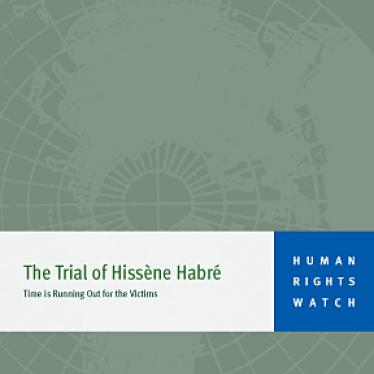(New York) – The decision to give the Right Livelihood Award to Jacqueline Moudeïna, the lawyer for the victims of the exiled former dictator of Chad, Hissène Habré, highlights the victims’ 20-year quest to bring Habré to justice, Human Rights Watch said today.
The award, announced on September 29, 2011, in Stockholm, cited Moudeïna, “for her tireless efforts at great personal risk to win justice for the victims of the former dictatorship in Chad and to increase awareness and observance of human rights in Africa.” The award, presented annually in the Swedish parliament, is widely known as the “Alternative Nobel Prize.” It is the first time that a Right Livelihood Award goes to a Chadian. The other three laureates in 2011 are Huang Ming (China), Ina May Gaskin (USA) and the international organization GRAIN.
“Jacky Moudeïna has risked everything, including her life, to bring Hissène Habré to justice,” said Reed Brody, counsel and spokesperson for Human Rights Watch. “This award shines a spotlight on Senegal’s refusal, after 20 long years, to give Habré's victims their day in court.”
In July 2010, Archbishop Desmond Tutu and 117 groups from 25 African countries denounced the “interminable political and legal soap opera” to which Habré’s victims had been subjected over 20 years.
Habré ruled Chad from 1982 until he was deposed in 1990 by the current president, Idriss Déby Itno, and fled to Senegal. Habré's one-party rule was marked by widespread atrocities, including waves of ethnic violence. Files of Habré's political police, the DDS, which were discoveredby Human Rights Watch, reveal the names of 1,208 people who were killed or died in detention and 12,321 victims of human rights violations.
Habré was first indicted in Senegal in 2000, but its courts ruled that he could not be tried there. His victims then filed a case in Belgium. After years of investigation, a Belgian judge in September 2005 issued an international arrest warrant against Habré, and Belgium requested his extradition. Senegal asked the African Union to recommend a course of action and in July 2006, the African Union called on Senegal to prosecute Habré “on behalf of Africa.” Years of stalling ensued, however, even after international donors fully funded the US$11.9 million trial budget in November 2010.
In May 2011, Senegal walked out of talks with the AU over the trial and made clear that it would not prosecute Habré in Senegal. On July 10, President Abdoulaye Wade of Senegal reversed a decision announced two days earlier to expel Habré to Chad, where he has been sentenced to death in absentia. Belgium made a second extradition request, which is pending.
In addition to the cases against Habré, Moudeïna took an enormous personal risk by filing criminal complaints in Chad itself against a number of Habré's accomplices, including the heads of the DDS, many of whom are still in positions of power in Chad. In June 2001, a security squad, led by Mahamat Wakayé, one of the men she is suing, threw a grenade at her while she was participating in a peaceful demonstration in N’Djaména, the Chadian capital. Moudeïna was severely injured from the shrapnel and still walks with difficulty ten years later.
“Jacky Moudeïna's work is a direct challenge to the continuing power of those who terrorized Chad in the Habré years,” Brody said. “Her determination to stand up for torture victims at great personal sacrifice is a shining example to us all.”






